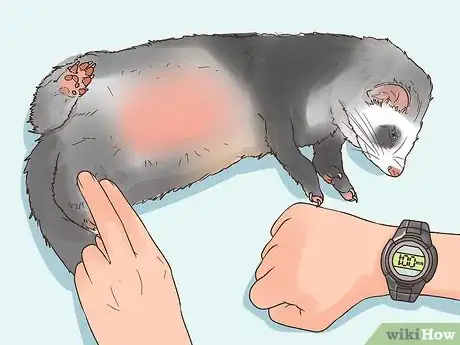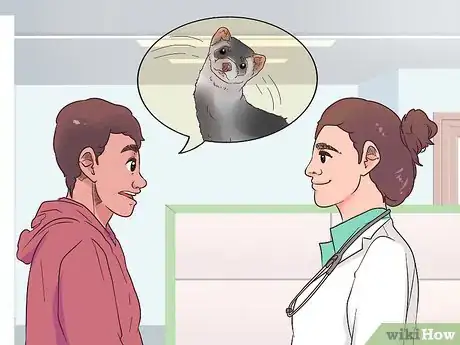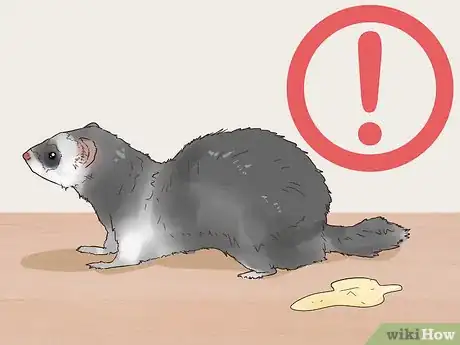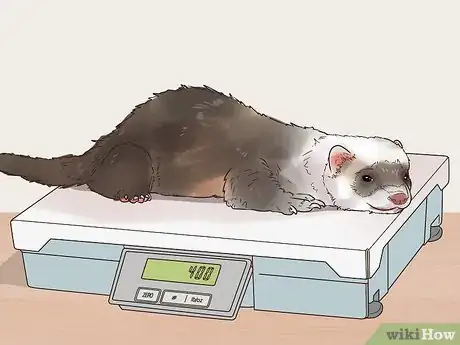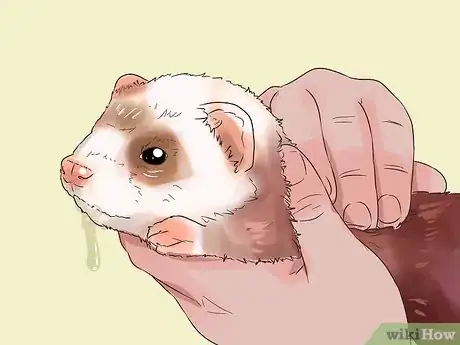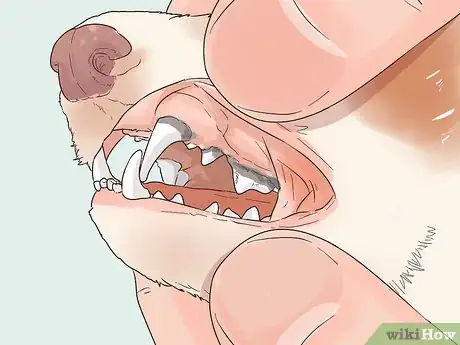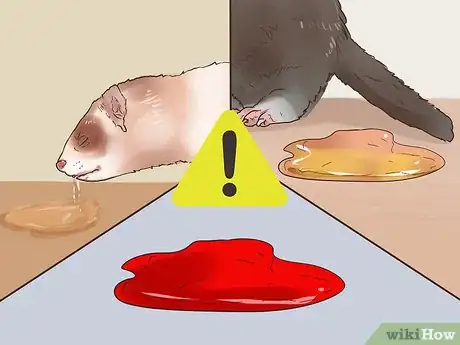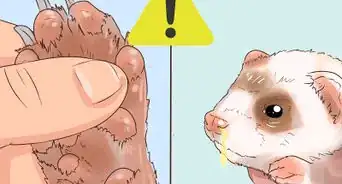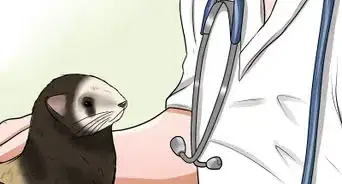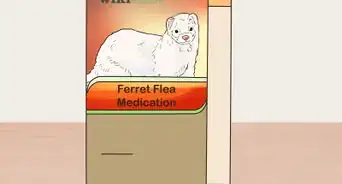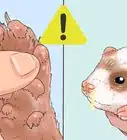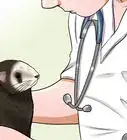This article was co-authored by Lauren Baker, DVM, PhD and by wikiHow staff writer, Megaera Lorenz, PhD. Dr. Lauren Baker is a Veterinarian and Assistant Scientist at the University of Wisconsin-Madison. With over 10 years in veterinary medicine, she specializes in the concept of “one health,” which uses insights from veterinary medicine to help human medical research. She holds a Ph.D. in Comparative Biomedical Sciences, a Doctor of Veterinary Medicine, an MS in Comparative Biomedical Sciences, and a Bachelor’s degree in Psychology from the University of Wisconsin-Madison.
There are 10 references cited in this article, which can be found at the bottom of the page.
This article has been viewed 28,462 times.
Ferrets are fun, lively pets that can live for up to 10 years with good care. However, they are prone to health problems, and many ferrets develop serious illnesses as they get older.[1] A lot of ferret health issues can be treated effectively if they are caught early enough. It's important to get your ferret to the vet quickly if you notice any signs of illness. If your ferret shows severe or life-threatening symptoms, go to the emergency vet immediately. Learn to recognize general signs of illness in ferrets, as well as symptoms that are associated with common ferret diseases.
Steps
Recognizing Severe Symptoms
-
1Get emergency care for severe respiratory distress. If your ferret is having severe respiratory symptoms, get it to the emergency vet right away. Signs of a respiratory emergency include:[2]
- Labored breathing or no breathing.
- A weak or absent pulse. You should be able to feel your ferret's pulse by putting your fingers on the artery in the inner thigh. A normal heart rate is 200-400 beats per minute.[3]
- Pale white or muddy-looking blueish gums.
-
2Call the vet right away for severe gastrointestinal symptoms. Serious gastrointestinal distress can be dangerous or fatal for a ferret. Get emergency medical help for your ferret if you notice:[4]
- Extreme difficulty passing stools, or inability to pass stools.
- Uncontrollable or bloody vomiting or watery diarrhea.
- Black or tarry stools.
- Bleeding from the rectum.
Advertisement -
3Go to the emergency vet for neurological symptoms. Look for signs of a serious disorder of your ferret's nervous system. If you see any of these symptoms, get immediate medical assistance:[5]
- Severe lethargy or unconsciousness.
- Seizures.
- Rapid twitching of the eyes.
- Unusual tilting of the head.
- Staggering or walking in circles.
- Walking on the knuckles or tops of the feet.
- Inability to move the hind limbs.
-
4Get immediate care for urinary symptoms. Problems with the urinary tract can quickly turn fatal in ferrets. Get your ferret to the vet right away if it is unable to urinate, has difficulty urinating, cries while urinating, or passes urine with blood in it.[6]
- Pay attention to the normal frequency and color of your ferret's urine. If you notice anything unusual, call the vet.
Recognizing General Symptoms of Illness
-
1Watch your ferret's appetite. Dramatic changes in appetite can signal a problem. A ferret that isn't feeling well may refuse to eat, or eat a lot less than usual. If your ferret refuses to eat, call your vet within 24 hours, even if there are no other symptoms.[7]
-
2Monitor your ferret's weight. Sudden weight loss or gain are also possible signs of illness.[8] Monitor your ferret's weight by weighing it once every two weeks on a kitchen scale. Keep track of your ferret's normal weight fluctuations throughout the year. If you notice anything unusual, call your vet.
- The normal weight range for a female ferret is 600–1,000 grams (21.2–35.3 oz) (1.3-2.2 lbs). Typical male ferrets range in weight from 1,000–2,000 grams (35.3–70.5 oz) (2.2-4.4 lbs).
-
3Look for vomiting and diarrhea. Runny stools and vomiting are common signs of illness in ferrets. If you notice your ferret having loose stools, or if it vomits two or three times within a 24-hour period, call your vet.[9]
- If you notice blood in your ferret's diarrhea or vomit, or if your ferret cannot stop vomiting, seek emergency veterinary care.
- Check your ferret's cage or litter box regularly to get an idea of what kinds of stools are normal for your ferret. Contact your vet if you see anything out of the ordinary.
-
4Check for drool. Drooling can signal a variety of problems in ferrets, including dental disease, metabolic disorders (such as cancer), gastrointestinal disorders, neurological diseases, or poisoning.[10] If you notice your ferret drooling a lot, make an appointment with your vet to try and figure out the underlying cause.
-
5Make note of bad breath. Bad breath in ferrets can have a lot of causes, including dental disease and problems with the esophagus.[11] If you notice that your ferret's breath smells particularly bad (and it doesn't seem to be a direct result of whatever it's just been eating), contact your vet to identify the cause of the issue.
-
6Observe unusual discharge. Sick ferrets may experience discharge (e.g., mucus or excessive tears) from the eyes, nose, or ears. If you notice any of these symptoms, take your ferret to the vet.[12]
-
7Watch for coughing and sneezing. Coughing, sneezing, wheezing, panting, or difficulty breathing are all signs of respiratory illness. If you notice your ferret doing any of these things, call your vet right away to make an appointment.[13]
Identifying Common Ferret Diseases
-
1Watch for signs of adrenal disease. Adrenal diseases are extremely common in ferrets. Some vets estimate that up to 50% of ferrets will eventually develop an adrenal tumor.[14] These issues tend to develop in ferrets four years of age or over. Check over your ferret's coat and body regularly for signs of thinning fur, balding, or loss of muscle mass. The typical symptoms of adrenal disease include:
- Balding on various parts of the body, or overall thinning of the coat.
- Lethargy.
- Itching.
- Swelling of the genitals in female ferrets.
- Difficulty urinating, especially in male ferrets.
- Loss of muscle mass.
- Changes in behavior, such as increased aggression or unusual sexual behaviors.
- Trembling or weakness in the hind legs.
-
2Look for symptoms of insulinoma. Ferrets frequently develop low blood sugar, caused by the growth of tumors on the pancreas. Insulinoma is a severe condition that can be managed, but not cured. Familiarize yourself with your ferret's normal behavior, and watch for unusual or sudden behavioral changes. Get your ferret to the vet immediately if you notice any unusual behaviors, especially these symptoms of insulinoma:[15]
- Staring at nothing.
- Staggering.
- Drooling.
- Fainting.
- Clenched or grinding teeth.
- Moaning, crying, or screaming.
-
3Check for signs of dental disease. Dental disease can cause serious problems for ferrets, such as systemic diseases and potentially fatal infections. Brush your ferret's teeth twice a month with a latex finger brush and feline toothpaste.[16] Examine your ferret's teeth at the same time, and go to the vet if you notice any of the following:[17]
- Dark buildup on the teeth.
- Redness, bleeding, or swelling of the gums.
- Blackened or missing teeth.
-
4Look out for signs of “Green Virus.” Although it is becoming less common, ferrets are prone to a particularly severe viral disease called Epizootic Catarrhal Enteritis (E. C. E.). This disease causes serious gastrointestinal symptoms that can be fatal if left untreated. Get your ferret to the vet right away if you notice any of these symptoms:[18]
- Bright green diarrhea.
- Vomiting.
- Refusal to eat and severe weight loss (usually starting after the diarrhea goes away).
-
5Watch for symptoms of lymphoma. A lymphoma is a type of tumor that affects the lymph nodes. Lymphomas can also appear in the spleen, liver, or bone marrow, and may spread to other parts of the body. Lymphomas can cause a variety of symptoms, but a few common ones include:[19]
- Poor appetite or refusal to eat.
- Weight loss.
- Lethargy.
- Vomiting, diarrhea, or bloody stools.
- Bloating.
- Difficulty breathing.
- Masses or lumps that you can see or feel.
- Weakness in the hind limbs.
References
- ↑ http://www.petful.com/pet-health/ferret-health-problems/
- ↑ http://www.peteducation.com/article.cfm?c=11+2065&aid=2898
- ↑ http://blog.vetdepot.com/normal-temperatures-pulse-rates-and-respiration-rates-for-pets
- ↑ http://www.peteducation.com/article.cfm?c=11+2065&aid=2898
- ↑ http://www.peteducation.com/article.cfm?c=11+2065&aid=2898
- ↑ http://www.peteducation.com/article.cfm?c=11+2065&aid=2898
- ↑ http://www.peteducation.com/article.cfm?c=11+2065&aid=2898
- ↑ http://www.peteducation.com/article.cfm?c=11+2065&aid=2898
- ↑ http://www.peteducation.com/article.cfm?c=11+2065&aid=2898
- ↑ http://www.petmd.com/ferret/conditions/mouth/c_ft_ptyalism
- ↑ http://www.peteducation.com/article.cfm?c=11+2065&aid=2898
- ↑ http://www.peteducation.com/article.cfm?c=11+2065&aid=2898
- ↑ http://www.peteducation.com/article.cfm?c=11+2065&aid=2898
- ↑ https://ferretassn.org/about-ferrets/health/illness-disease/common-major-illness/adrenal-disease-treament-options/
- ↑ https://ferretassn.org/about-ferrets/health/illness-disease/common-major-illness/insulinoma/
- ↑ https://www.petfinder.com/pet-care/small-and-furry-care/ferret-teeth-dental-care/
- ↑ https://ferretassn.org/about-ferrets/health/illness-disease/common-major-illness/dental-disease/
- ↑ https://ferretassn.org/about-ferrets/health/illness-disease/common-major-illness/epizootic-catarrhal-enteritis/
- ↑ https://vcahospitals.com/know-your-pet/ferrets-lymphoma-or-lymphosarcoma
About This Article
To tell if your ferret is sick, watch for common signs that something is wrong, like lack of appetite, vomiting, diarrhea, weight loss, drooling, coughing, sneezing, discharge, and bad breath. If you think your ferret is sick, take it to see a vet as soon as possible so they can diagnose the issue and recommend the best treatment plan. However, if you notice severe symptoms of illness, like difficulty breathing, a weak pulse, pale or blueish gums, bleeding, difficulty urinating, seizures, or difficulty walking, you should take your ferret to an emergency vet right away for treatment. For advice from our Veterinary co-author, like how to identify common ferret diseases, scroll down!
